Visitors and nature enthusiasts alike traveled along the long, winding roads of Western North Carolina Saturday to attend a festival of particular interest. It was entirely dedicated to the celebration of a mysterious, two-foot-long salamander that lurks in the crystal clear waters of Western North Carolina’s Appalachian mountains.
The first North Carolina Hellbender Festival was held in downtown Spruce Pine from 10 a.m. to 9 p.m. With a mixture of artists, environmental conservation-geared vendors and live music, the festival featured activities targeted toward all ages. Hundreds of attendees filed up and down the street.
One popular activity was the “Meet a Hellbender” booth. As the name of the festival would suggest, Rocky, a 17 year old Hellbender, was the star of the booth. Long lines of people formed to catch a glimpse of him in his terrarium, perched on a rock platform.
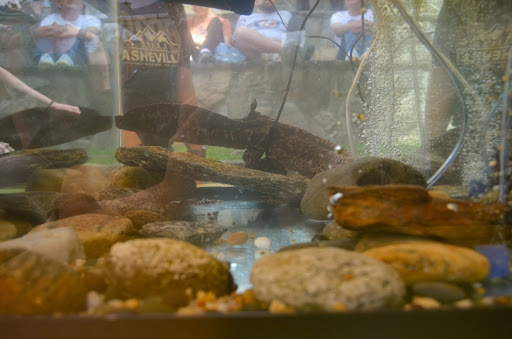
Ben Dalton, a wildlife diversity technician with the North Carolina Wildlife Resources Commission, helped oversee Rocky’s care at the festival, educating attendees and sharing the Hellbender’s story.
Rocky was born in captivity, having come from a rescued clutch of eggs that washed out of their nest. He travels to different events to provide educational opportunities to the public and serves as an advocate.
“He earns his keep, a few days a year, working at outreach events like this,” Dalton said.
Dalton said Rocky’s presence was significant for those who live near Hellbenders but may have never had the chance to meet one before.
Dalton said Hellbenders can be found throughout the Appalachian mountains, stretching as far north as New York, and, for some populations, as far south as Northern Georgia and westward into Kentucky and Missouri. They’re typically found in headwaters and watersheds throughout the mountains, though none live in Atlantic draining streams, he said.
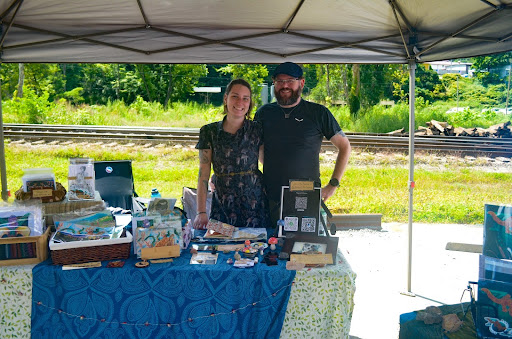
While the Hellbender population has been in decline for many years, Dalton said Western North Carolina’s population is one of the last refuges of healthy, producing salamanders in the country.
One reason for this, Dalton said, is that many of the headwaters they inhabit are protected, providing clean, clear and cool water — the ideal conditions Hellbenders need to thrive.
“Hellbenders, like a lot of amphibians, their skin is semi-perminable,” Dalton said. “Hellbenders kind of take that to the extreme, because they breathe almost entirely through their skin.”
Because of the way they breathe, Hellbenders need extremely clean water to sustain their population. While they can endure short-term disturbances, Dalton said any long-term disturbances can negatively impact their already endangered population.
A decline in a Hellbender population can serve as an early environmental indicator of poor water quality. Dalton said their sustained presence in an ecosystem means other species that rely on the aquatic habitat, such as trout, are also likely thriving.
“There’s a lot to be gained by just promoting good Hellbender habitat across the board,” he said.
Many vendors were nonprofit organizations focused on conservation and the celebration of Appalachian culture. Rachel Rosolina, the senior director of connection and communication of Appalshop, was in attendance and was a vendor at the event.
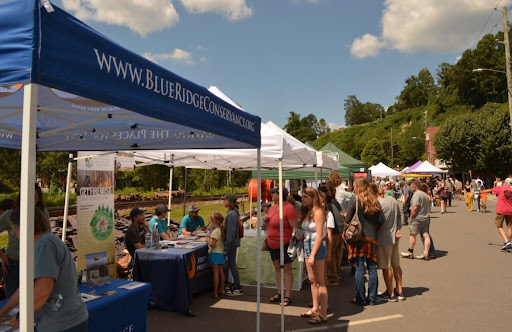
AppalShop is a media arts nonprofit located in Eastern Kentucky. It started as a documentary film workshop and later expanded into other areas of storytelling, like radio, archives, record labels and community health work.
“We’re trying to make sure folks outside of Eastern Kentucky know that we exist and that we still represent all of Appalachia in our archives and in our films,” she said. “It’s been a great opportunity.”
Julie Davis is an artist who runs her business, Periwinkle Arts, with her husband and her daughter. Together, the family set up their booth in the designated area for artists to sell.
The trio are all graduates of App State, and Davis previously worked for Cheap Joe’s Art Supplies in Boone. A collection of Davis’ work focuses on her agate series, inspired by her love and interest in gemstones. Her husband specializes in watercolor landscapes, and her daughter is the graphic designer for the T-shirts and tote bags they sell.
Davis said she was inspired to attend the festival because it’s a fun activity with her family.
Penland School of Craft, located in Mitchell County, had a booth set up where Program Coordinator for Community Collaboration Therese Watkins and others associated with the school did a live weaving demonstration for the crowd. She encouraged attendees to come up to the booth and contribute, calling it a “group effort.”
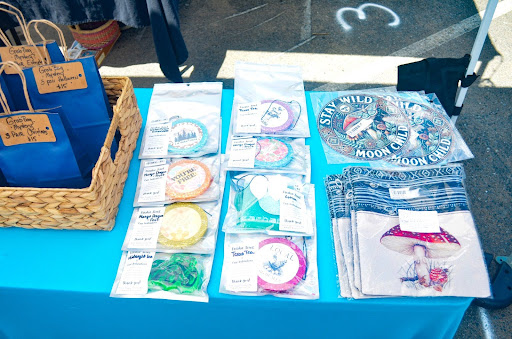
Watkins said her team used wisteria branches harvested from Penland’s campus to create the structure for the large Hellbender, and kudzu leaves to fill it in.
Attendees Zack Grove and Christi Grove said it was great to see the turnout and local businesses open, and they were both rooting for local businesses that hadn’t yet made their “comeback” after Hurricane Helene.
Christi Grove said it was inspiring to see the area “come back to life.”
Another person with the wellbeing of the community in mind post-Helene was Executive Director of downtown Spruce Pine, Spencer Bost, who helped plan and organize the event. Bost wanted the festival, which had 70 vendors, to be a celebration of arts, crafts, music and environmental conservation.
“We wanted to create a unique festival,” Bost said. “Something that was really interactive and fun.”
The idea to create the festival originated in May of last year. But after Helene, Bost said he questioned whether or not the festival was still a feasible idea.
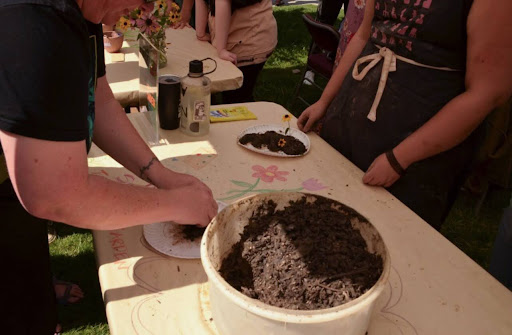
The community of Spruce Pine was heavily impacted by Helene, Bost said. Eleven months ago, the festival’s grounds were flooded with eight and a half feet of murky water.
But after a few months, Bost saw progress was being made in his community, and approximately six months before the event was held, he and his team started officially planning it.
Bost graduated from App State with a degree in recreation management. He applied to be a park ranger and was stationed in Spruce Pine on the Blue Ridge Parkway. Now, he works for the town and lives in the community.
The executive director said he’s glad to see the community starting to bounce back, with many businesses having reopened or in the process of reopening their doors. Bost said his team decided to limit the number of food trucks to two, to encourage visitors to enjoy the festival and later dine in the local restaurants that are still getting back on their feet.
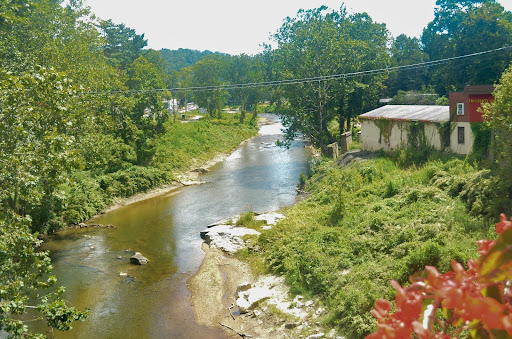
“We’re kind of approaching it with a resiliency message,” he said.
Though he’s avid about the conservation of the Hellbender, Bost said the presence of the festival has a double meaning — one that speaks a message about his community.
“Our idea is that if these weird, squishy amphibian salamanders can survive something as traumatic as Hurricane Helene, surely we can do the same,” he said.


